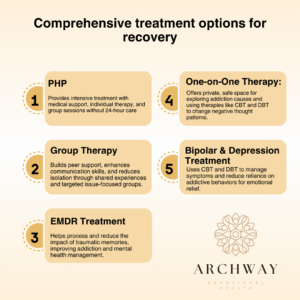Addiction is a relentless beast, feeding off the very essence of our lives. For those struggling with addictive personalities, the cost can be astronomical—extending beyond the financial toll to the very fabric of one’s mental health and relationships. Understanding the dynamics of addictive behaviors and exploring effective mental health treatments like CBT and DBT can offer hope and recovery.
Understanding Addictive Personalities
An addictive personality is characterized by a propensity for developing intense, compulsive behaviors. These individuals are often drawn to substances or activities that provide immediate gratification, despite the long-term consequences. Whether it’s alcohol, drugs, gambling, or even technology, the addictive personality tends to pursue these highs with little regard for the fallout.
This behavior often stems from underlying psychological issues, such as trauma, unresolved emotional conflicts, or a tendency towards impulsivity. Addictive personalities frequently experience difficulties in managing stress and emotions, which can lead them to seek solace in unhealthy habits. Their brains may also be wired differently, with a heightened sensitivity to rewards and a diminished capacity for self-control.
The Emotional and Social Costs
The emotional toll of addiction is profound. Individuals with addictive personalities often grapple with feelings of guilt, shame, and anxiety. Their compulsive behaviors can lead to a cycle of temporary relief followed by intense self-recrimination, creating a vicious loop that’s hard to break. This emotional turbulence can erode self-esteem and lead to chronic mental health issues, such as depression and anxiety disorders.
Socially, the impact is equally severe. Relationships with family and friends often suffer as the addictive behavior becomes the central focus. Trust is eroded, and interpersonal connections become strained. The addictive personality may prioritize their habit over relationships, leading to isolation and a breakdown of social support networks.
Effective Treatments for Addictive Behaviors
Addressing addictive behaviors requires a comprehensive approach that targets both the symptoms and underlying causes. Several evidence-based treatments have proven effective in helping individuals overcome addiction and rebuild their lives.
Cognitive Behavioral Therapy (CBT) is where by working with a therapist, individuals can develop healthier coping strategies and learn to manage triggers effectively. CBT therapy encourages clients to understand the connection between their thoughts, feelings, and behaviors, and to make constructive changes that support recovery.
Dialectical Behavior Therapy (DBT) is another valuable treatment, particularly for those with emotional regulation difficulties. DBT therapy combines cognitive-behavioral techniques with mindfulness practices to help individuals manage intense emotions and improve interpersonal relationships. This therapy is particularly beneficial for individuals who experience extreme mood swings and impulsivity, common traits in addictive personalities. By focusing on acceptance and change, DBT empowers individuals to navigate their emotional landscape without resorting to addictive behaviors.
Mental health Treatment Programs offer structured support for individuals seeking to overcome their addiction. They provide a safe environment where individuals can work on their recovery with the guidance of professionals.
Integrating Therapy with Lifestyle Changes
Building a strong support network of friends and family can also play a significant role in maintaining sobriety and preventing relapse.
Mindfulness and stress management techniques, such as meditation and deep breathing exercises, can help individuals manage cravings and emotional distress. Developing new hobbies and interests can provide alternative sources of gratification and fulfillment, reducing the allure of addictive behaviors.
Comprehensive Treatment for Recovery
Effective treatment for addictive personalities requires a comprehensive approach. Here are some levels of care and therapies that play a vital role in recovery:
1. Partial Hospitalization Program (PHP)
PHP offers a structured treatment environment without requiring 24-hour care. It’s ideal for individuals who need intensive treatment but don’t require full-time hospitalization. In this program, patients receive a combination of medical support, individual therapy, and group sessions, all while maintaining some independence.
2. One-on-One Therapy
Individual therapy sessions allow clients to explore the root causes of their addiction in a private, safe space. Therapies like Cognitive Behavioral Therapy (CBT) and Dialectical Behavior Therapy (DBT) are especially effective for addressing addictive personalities. These therapies focus on changing negative thought patterns and developing healthier coping mechanisms.
3. Group Therapy
Group therapy fosters connection and support among peers who understand the struggles of addiction. It also helps build communication skills and reduces feelings of isolation. Groups focusing on specific issues, such as trauma, OCD, or self-harm, provide targeted support for co-occurring conditions.
4. Bipolar and Depression Treatment
For individuals with bipolar disorder or depression, specialized therapies are crucial. CBT helps manage the highs and lows of bipolar disorder, while DBT can assist with emotional regulation. Proper treatment can drastically reduce the likelihood of turning to addictive behaviors for relief.
5. Trauma Treatment (EMDR)
Many individuals with addictive personalities also have a history of trauma. Eye Movement Desensitization and Reprocessing (EMDR) is a highly effective trauma therapy that helps patients process painful memories and reduce their emotional impact. By addressing trauma, patients can better manage their addiction and mental health.
Conclusion
The high price of an addictive personality extends far beyond the immediate consequences of the addiction itself. However, with effective mental health treatments like CBT and DBT, combined with lifestyle changes and a strong support system, recovery is possible.
Understanding the impact of addictive personalities and exploring comprehensive treatment options can provide a path to healing. By addressing the root causes of addiction and adopting healthier coping strategies, individuals can reclaim their lives and build a future free from the shadows of their past habits.
If you or someone you love is struggling with addiction or an addictive personality, don’t wait. Comprehensive treatment is available, and recovery is possible. Contact us at (888) 488-4103 to learn more about our specialized programs for trauma, depression, OCD, and more, and take the first step toward a healthier, more balanced future.
FAQs About Understanding Addictive Personalities
Are addictive personalities predetermined?
While genetic factors may play a role, addictive personalities are not solely determined by genetics. Environmental factors, upbringing, and life experiences can also contribute.
Can anyone become addicted?
Yes, anyone can become addicted, regardless of their personality traits. However, certain individuals may be more vulnerable due to genetic, environmental, or psychological factors.
Is having these traits a guarantee of addiction?
No, having these personality traits does not guarantee that someone will become addicted. It’s important to remember that addiction is a complex disease with multiple contributing factors.
What are some effective treatment options for addiction?
Treatment for addiction often involves a combination of therapies, including:



